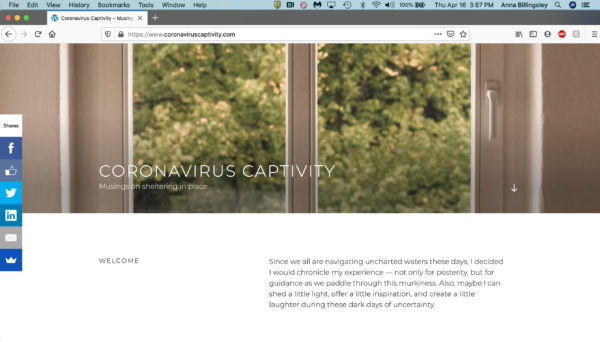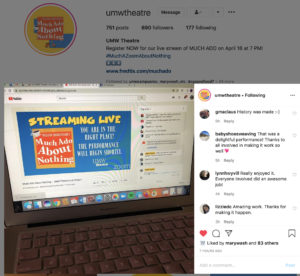From UMW:
Reference Librarian Peter Catlin was set to get married in Virginia Beach in May. But the state’s COVID-19 stay-at-home order canceling public gatherings put a kink in his wedding plans. Instead, after many attempts, the couple got special permission from Fredericksburg’s clerk of circuit court, who married them on the sidewalk outside the city courthouse.

The nuptials marked the beginning of a life together and, when Catlin typed up his story, something else – a special UMW Libraries initiative named Call to Contribute. “It was a very cool start to the project,” said Records Coordinator Sarah Appleby ’06.
The University’s archiving team likes to dig deep in the past, but its mission is also to gather current experiences so future historians can better understand today. To do that, they are asking the UMW community to help create a record of what lives look like in these days of quarantine, remote learning, hand-sewn masks and Zoom meetings.
“We see history happening, and we have to do something to make sure that doesn’t just go away,” Appleby said of the effort.
The team – Carolyn Parsons ’83, head of Special Collections and University Archives; Angie Kemp ’11, digital resources librarian; and Appleby – will collect and digitize a variety of COVID-19 related materials, from diaries and blogs to artwork and photography. They encourage anyone affiliated with Mary Washington to contribute.
An online guide gets ideas flowing, with suggested coronavirus-inspired contributions, like recorded audio or video stories, journals kept on paper or online, written narratives of unique moments, podcasts, works of art, textiles and even photos of quarantine baked goods.
The idea of collecting and documenting personal stories and submissions emerged from the work the librarians already were doing. The Special Collections and University Archives team has been capturing records of most of the content the University creates, and since 2014, they’ve been crawling UMW’s web presence and archiving it, too.

They’ve built a coronavirus collection that includes University postings, videos and webpages, plus archival captures of the UMW COVID-19 FAQ and Updates page. The assemblage is private now, but the team’s mission is to soon make it public through its digital archives.
“Right now, the goal is just to collect as much as we can,” Kemp said.
Collections like these include huge files – like videos and photos – that eat up storage space. But, Parsons said, the digital preservation firm Preservica, which hosts UMW’s library archives, has donated 250 GB of storage. “So, we don’t have to be as concerned about having the space to store this content.”
When classes went online early this spring, UMW Libraries went to work, scanning thousands of pages for faculty and students, fielding interlibrary loan requests and sending scanned materials to help other institutions. They consulted with students by phone, chat, email and Zoom. They set up curbside pickup of library materials, extended due dates, and waived fines and fees.
And they began collecting snapshots of how these changes – and others – caused by COVID-19 are shaping the world, launching an initiative aimed to capture today and inform the future.
Call to Contribute has no set deadline, so people can create over time and give thought and perspective to their reactions to the pandemic. At the end, if they no longer want to share what they’ve made, there’s no commitment.
“Anyone can email or call if they have questions. We all are still working remotely, and we welcome it,” Parsons said of her team. “If they start something and they think, ‘I wonder if I am on the right track?’ they can check in with us.”
Learn more about Call to Contribute. Visit UMW’s “Using the Library During the COVID-19 Pandemic” page, read a blog about the initiative, and direct questions to [email protected] or 540-654-1752.

























